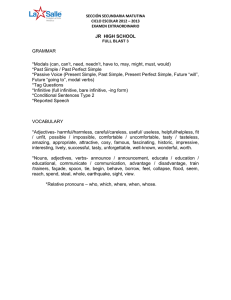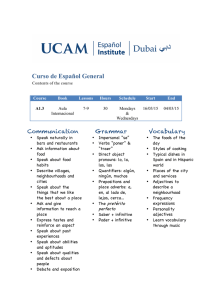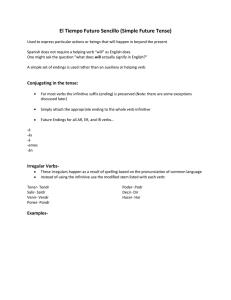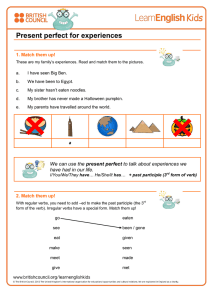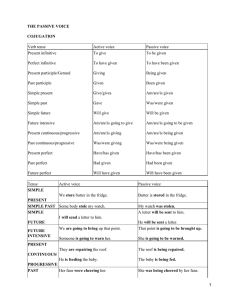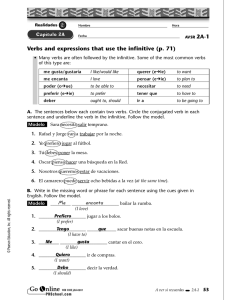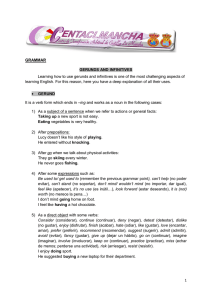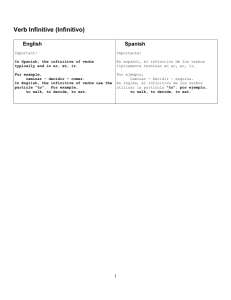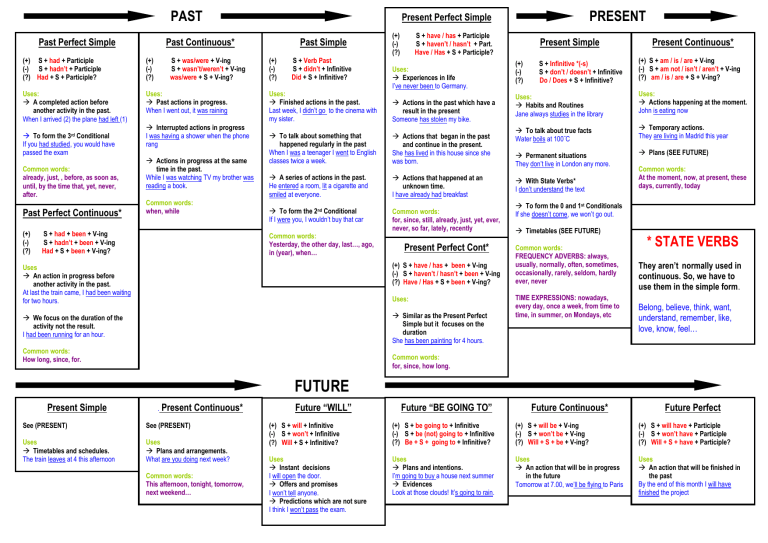
PAST Past Perfect Simple Past Continuous* (+) S + had + Participle (-) S + hadn’t + Participle (?) Had + S + Participle? (+) (-) (?) Uses: A completed action before another activity in the past. When I arrived (2) the plane had left (1) Uses: Past actions in progress. When I went out, it was raining To form the 3rd Conditional If you had studied, you would have passed the exam Common words: already, just, , before, as soon as, until, by the time that, yet, never, after. Past Perfect Continuous* (+) (-) (?) S + was/were + V-ing S + wasn’t/weren’t + V-ing was/were + S + V-ing? Interrupted actions in progress I was having a shower when the phone rang Actions in progress at the same time in the past. While I was watching TV my brother was reading a book. Common words: when, while S + had + been + V-ing S + hadn’t + been + V-ing Had + S + been + V-ing? PRESENT Present Perfect Simple Past Simple (+) (-) (?) S + Verb Past S + didn’t + Infinitive Did + S + Infinitive? Uses: Finished actions in the past. Last week, I didn’t go to the cinema with my sister. (+) (-) (?) S + have / has + Participle S + haven’t / hasn’t + Part. Have / Has + S + Participle? Uses: Experiences in life I’ve never been to Germany. Actions in the past which have a result in the present Someone has stolen my bike. To talk about something that happened regularly in the past When I was a teenager I went to English classes twice a week. Actions that began in the past and continue in the present. She has lived in this house since she was born. A series of actions in the past. He entered a room, lit a cigarette and smiled at everyone. Actions that happened at an unknown time. I have already had breakfast To form the 2nd Conditional If I were you, I wouldn’t buy that car Common words: for, since, still, already, just, yet, ever, never, so far, lately, recently Common words: Yesterday, the other day, last…, ago, in (year), when… Present Perfect Cont* Uses An action in progress before another activity in the past. At last the train came, I had been waiting for two hours. (+) S + have / has + been + V-ing (-) S + haven’t / hasn’t + been + V-ing (?) Have / Has + S + been + V-ing? We focus on the duration of the activity not the result. I had been running for an hour. Similar as the Present Perfect Simple but it focuses on the duration She has been painting for 4 hours. Uses: Common words: How long, since, for. Present Simple (+) (-) (?) S + Infinitive *(-s) S + don’t / doesn’t + Infinitive Do / Does + S + Infinitive? Present Continuous* (+) S + am / is / are + V-ing (-) S + am not / isn’t / aren’t + V-ing (?) am / is / are + S + V-ing? Uses: Habits and Routines Jane always studies in the library Uses: Actions happening at the moment. John is eating now To talk about true facts Water boils at 100¨C Temporary actions. They are living in Madrid this year Permanent situations They don’t live in London any more. Plans (SEE FUTURE) With State Verbs* I don’t understand the text Common words: At the moment, now, at present, these days, currently, today To form the 0 and 1st Conditionals If she doesn’t come, we won’t go out. Timetables (SEE FUTURE) Common words: FREQUENCY ADVERBS: always, usually, normally, often, sometimes, occasionally, rarely, seldom, hardly ever, never TIME EXPRESSIONS: nowadays, every day, once a week, from time to time, in summer, on Mondays, etc * STATE VERBS They aren’t normally used in continuous. So, we have to use them in the simple form. Belong, believe, think, want, understand, remember, like, love, know, feel… Common words: for, since, how long. FUTURE Present Simple . Present Continuous* See (PRESENT) See (PRESENT) Uses Timetables and schedules. The train leaves at 4 this afternoon Uses Plans and arrangements. What are you doing next week? Common words: This afternoon, tonight, tomorrow, next weekend… Future “WILL” Future “BE GOING TO” Future Continuous* Future Perfect (+) S + will + Infinitive (-) S + won’t + Infinitive (?) Will + S + Infinitive? (+) S + be going to + Infinitive (-) S + be (not) going to + Infinitive (?) Be + S + going to + Infinitive? (+) S + will be + V-ing (-) S + won’t be + V-ing (?) Will + S + be + V-ing? (+) S + will have + Participle (-) S + won’t have + Participle (?) Will + S + have + Participle? Uses Instant decisions I will open the door. Offers and promises I won’t tell anyone. Predictions which are not sure I think I won’t pass the exam. Uses Plans and intentions. I’m going to buy a house next summer Evidences Look at those clouds! It’s going to rain. Uses An action that will be in progress in the future Tomorrow at 7.00, we’ll be flying to Paris Uses An action that will be finished in the past By the end of this month I will have finished the project
